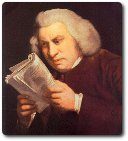Songs of Innocence and Experience Contents
- Social / political context
- Religious / philosophical context
- Literary context
- Textual history
- Songs of Innocence
- Introduction (I)
- The Shepherd
- The Ecchoing Green
- The Lamb
- The little black boy
- The Blossom
- The chimney sweeper (I)
- The little boy lost (I)
- The Little Boy Found
- Laughing song
- A Cradle Song
- The Divine Image
- Holy Thursday (I)
- Night
- Spring
- Nurse's Song (I)
- Infant Joy
- A Dream
- On Another's Sorrow
- Songs of Experience
- Introduction (E)
- Earth's Answer
- The Clod and the Pebble
- Holy Thursday (E)
- The Little Girl Lost
- The Little Girl Found
- The Chimney Sweeper (E)
- Nurse's Song (E)
- The Sick Rose
- The Fly
- The Angel
- The Tyger
- My Pretty Rose-tree
- Ah! Sun-flower
- The Lilly
- The Garden of Love
- The Little Vagabond
- London
- The Human Abstract
- Infant Sorrow
- A Poison Tree
- A Little Boy Lost (E)
- A Little Girl Lost
- To Tirzah
- The Schoolboy
- The Voice of the Ancient Bard
- A Divine Image
The Age of Reason
The elevation of rationality
The eighteenth century is frequently referred to as ‘The Age of Reason'. It was marked by confidence in the powers of the human mind to discover the secrets of the universe. Human beings felt capable of discovering the workings of the world, from the human body to the solar system, by the application of science and rationality. The world was open to scientific enquiry. It could be measured, analysed and exploited.
Earlier ages had been marked by a belief that, since God was the creator of all things and could not be fully comprehensible to human minds, human understanding and reason could not reliably grasp the whole ‘truth'. People would expect the world to involve an element of mystery. However, this perception shifted in the Age of Reason to a belief that human reason could be the ultimate judge of truth.
Confidence in human analysis
 The eighteenth century saw an increasing confidence that human beings could gather together all information about the world and put it into an organised form. This meant that this was the century when the first dictionaries and encyclopaedias were compiled. It was believed that dictionaries could tie down the origin and meaning of words, whilst language could be standardised by establishing the rules of grammar. Consequently, Samuel Johnson is perhaps better known for his dictionary than for his other literary output.
The eighteenth century saw an increasing confidence that human beings could gather together all information about the world and put it into an organised form. This meant that this was the century when the first dictionaries and encyclopaedias were compiled. It was believed that dictionaries could tie down the origin and meaning of words, whilst language could be standardised by establishing the rules of grammar. Consequently, Samuel Johnson is perhaps better known for his dictionary than for his other literary output.
